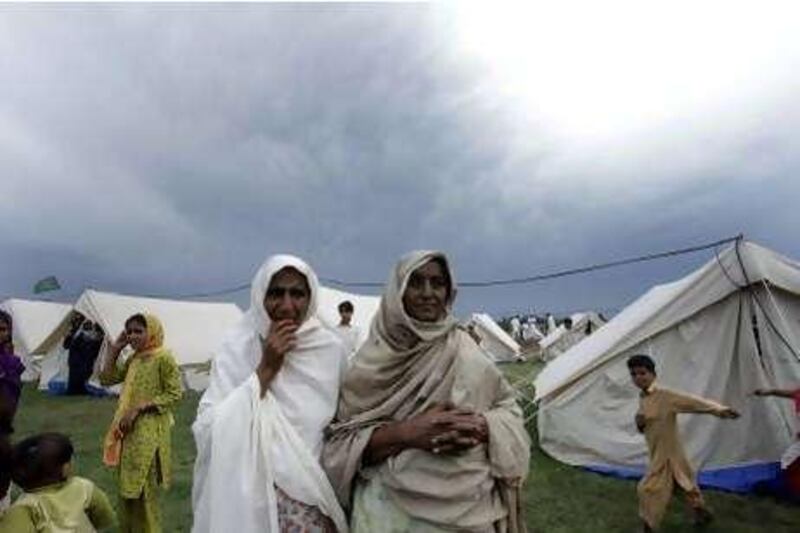The UAE Red Crescent Authority (RCA) began building homes yesterday for 20,000 families affected by the floods that have devastated Pakistan. The project, worth US$7.8 million (Dh28.6m), co-financed by the RCA and the United Nations High Commissioner for Refugees (UNHCR), will involve erecting thousands of seven-person tents in the Khyber Pakhtunkhwa region, which was hit hard by the floods.
The tents, made from all-weather material, are expected to be ready by the end of November. "During the 10-week period [until then], whenever a tent is ready, a family will be moving in - we won't wait until the whole project is ready," said Mohammed al Qamzi, secretary general of the RCA. A follow-up project will transfer the families to transitional homes, which can also be modified to become permanent houses.
"We are facing a human crisis that hasn't been experienced in modern history before, so we have to act immediately and try to implement as much as we can in the shortest time possible," said Yacoub el Hillo, regional representative of GCC countries in the UNHCR. "This project is only a first step in a series of programmes to follow. Now that the floodwater has started retreating, we can better assess what needs to be done and start executing projects on the ground," he added.
The UAE is already one of the largest financial donors to Pakistan, sending more than Dh110 million after a recent RCA telethon. Donations are still coming in. "People of the UAE showed great generosity - everyone was donating, regardless of the amount. Some people donated a dirham, some women donated jewellery and some companies offered transport services," Mr al Qamzi said. "We even received donations from other countries, including the US and Britain," he added.
The RCA plans to remain in Pakistan for the long term as more projects are introduced. "We will be looking at the needs that evolve; we'll try to provide aid in various fields; we'll be looking at schools, health and shelter," he said. "Right now we are in the crisis-response stage, but once the rebuilding stage begins, more requirements will evolve and more funds will be needed." It has been estimated that more than $2 billion (Dh7.34bn) will eventually be required.
"I was speaking with the Pakistani prime minister, Yousaf Raza Gilani, and he said 1.1 million tents are needed to provide shelter to all the people who lost their homes," he said. "Even if all the tent factories in the world work together they cannot provide that much wood and material. That is why the presence of the RCA will continue in Pakistan as long as it is needed." Since the beginning of the crisis, the UAE has provided many forms of aid. Three Armed Forces helicopters have been deployed, each carrying 35 tonnes of relief materials, including food and medicines. Three more will be sent this week. A ship is also being prepared to ferry similar materials.
The authority also has been sending six-person volunteer medical teams to provide aid to refugees in Peshawar. A field hospital was set up and the RCA helped the existing Ibrahimi charity hospital double the number of beds to 90 from 45 and add to the 35 medical personnel. The RCA has also been providing vaccines to women and children in coordination with Unicef. A total of 625,000 vaccine doses were sent to Jacobabad in northern Pakistan. Children aged from six months to five years are being given the measles vaccine, while young women receive two doses of tetanus vaccine.
hdajani@thenational.ae







